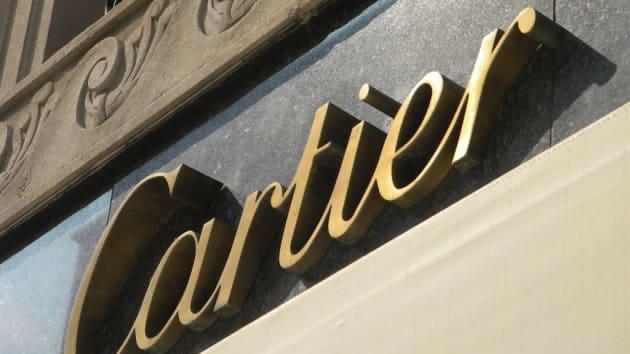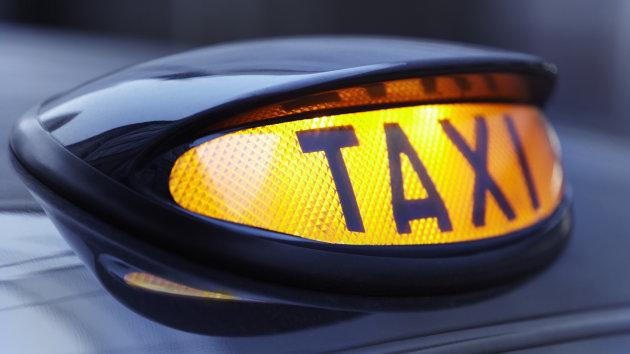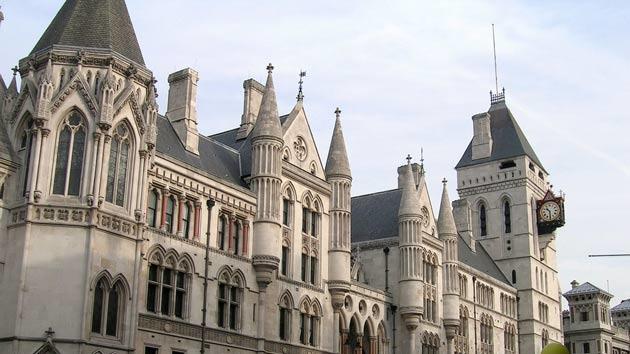highcourt
Latest

UEFA secures UK court order to block illegal soccer streams
Tearing a leaf out of the English Premier League's playbook, the Union of European Football Associations -- better known as UEFA -- has been granted the power to block illegal match streams by the UK's High Court. UEFA won't actually be doing any of the dirty work, of course. Rather, the injunction allows UEFA to instruct the UK's biggest ISPs (BT, Virgin Media, Sky, TalkTalk, EE and Plusnet) to do the blocking on its behalf. Instead of targeting random websites hosting illegal football (yes, we mean soccer) streams, this particular anti-piracy measure stops the signal at the server level, effectively killing the weed at its root.

Uber will appeal compulsory English exam for London drivers (updated)
Uber continues to fight against an upcoming rule change that would force London drivers to pass an English language exam. Today, the ride-hailing company has won the right to appeal the requirement, originally proposed by Transport for London in March 2016, that all private hire chauffeurs hold an English GCSE or, if they're from a predominantly non-English speaking country, B1-level qualification. Uber broadly supports the rule change, but thinks the written exam component is unfair. "Writing an essay has nothing to do with communicating with passengers or getting them safely from A to B," Tom Elvidge, Uber's General Manager for London said.

Uber loses High Court bid to block English language driver tests
Uber's operations in London have been dealt a fresh blow after the High Court ruled that it, and other private hire companies in the city, must force drivers to pass an English language test. The ride-hailing provider was attempting to overturn strict new rules proposed by Transport for London (TfL) last year that included reading and writing tests for drivers, better customer support and private-hire insurance for period when drivers weren't even working.

UK judge grants girl's dying wish to be cryogenically frozen
In what's thought to be the first case of its kind, a UK judge granted a dying girl's last wish to be cryogenically frozen. The 14-year-old was diagnosed with a rare form of cancer last year, but as of this August was switched from active treatment to palliative care. She began researching cryonics and decided to be frozen following her death, but had to take the legal route to ensure her wishes were respected when her estranged father disagreed with what should happen to her body. After several hearings, a High Court judge granted her mother sole responsibility for making arrangements, and the girl now rests in the Cyronics Institute in the US.

London's High Court rules Uber is legal, but its troubles aren't over
Uber and other ride-hailing services like it have completely changed the way we interact with on-demand transport. But being a new, popular force in a traditional industry has its downsides. When Uber isn't taking flak from local taxi firms, it's sitting in a courtroom trying to justify the legality of its business model. This is true the world over, and it's no different in London, where the capital's High Court has just ruled that the way Uber calculates fares is legal. It's a huge win for the company, because if the decision had gone the other way, it would've effectively outlawed Uber's entire London fleet, and possibly set a precedent for other UK cities to follow suit.

High Court to decide Uber's London fate in October
A long-running legal dispute between Uber and the UK's Licensed Taxi Drivers Association (LTDA) may soon come to an end. Starting on October 5th, the High Court will hold a hearing with both parties and Transport for London (TfL) to determine whether the smartphones used by Uber drivers are technically the same as taximeters.

UK's emergency surveillance law struck down by MPs
The High Court has ruled today that parts of the UK's emergency surveillance legislation, the Data Retention and Investigatory Powers Act 2014 (DRIPA), is unlawful. Conservative MP David Davis and Labour MP Tom Watson, represented by the Liberty human rights organisation, have successfully argued that the law breaks the public's right to a private life and to the protection of personal data, set out in the EU Charter of Fundamental Rights. Section 1 and 2 of DRIPA, which forces telecoms companies and internet providers to store customer data for up to 12 months, will now be abolished in March next year. The law is due to expire at the end of 2016 anyway, but bringing the date forward for these two crucial points could force the government to introduce replacement legislation earlier.

UK ISPs ordered to block e-book piracy sites
In a major victory for book publishers, the UK's High Court has ordered internet service providers (ISPs) to block several sites offering pirated e-books. The decision means that BT, Sky, Virgin Media, TalkTalk and EE now have 10 days to comply and ensure their customers can't access the following link depositories: AvaxHome, Ebookee, Freebookspot, Freshwap, Libgen, Bookfi and Bookre. The Publishers Association (PA), which sought the blocks under the UK's Copyright Design and Patents Act 1988, claims the sites collectively hold around 10 million e-books, and that at least 80 percent of them are infringing copyright. It's been described as the "first action of its kind brought by UK book publishers," following similar ISP blocks levied against sites hosting music, movies and TV shows.

High Court forces UK ISPs to block websites selling fake luxury goods
Her Majesty's High Court of Justice has served as the stage for several high-profile cases in recent years that've resulted in UK ISPs being forced to block certain nefarious websites. Typically, these have involved entertainment giants that want to make it harder for illegal file-sharing sites like the infamous Pirate Bay to connect with their audiences. But now, ISPs have been given a new target: websites selling counterfeit goods. Said to be the first ruling of its kind in Europe, the High Court has today ordered that Sky, BT, Virgin, EE and TalkTalk -- which collectively provide 95 percent of all UK broadband -- must block a handful of websites that sell fake versions of products made by the likes of luxury brands Cartier and Mont Blanc.

London's black cab body takes Uber drivers to court but delays chance of making real change
If last month's protest wasn't a big enough hint, London's black cabbies are far from pleased with losing business to disruptive competitor Uber. The Licensed Taxi Drivers Association (LTDA) is adamant that Uber operates outside the law, as private vehicles aren't allowed to carry taximeters. Transport for London (TfL) has plainly concluded the way Uber calculates fares using a mobile app is not the same as operating a taximeter, and is completely legal. Tired of constantly repeating itself, TfL has referred the dispute to London's High Court, and this escalation offers a glimmer of hope to black cabbies, in that the law or the current interpretation of it could change to validate the taximeter argument.

Black cab feud with Uber will be decided by London's High Court
It's safe to say that London's black cabbies don't like Uber, or anything like it. While it could simply be that they're bothered by the new-style competition, traditional taxi drivers also argue Uber's use of smartphones to calculate fares is illegal, since private cars aren't allowed taximeters. Transport for London (TfL) doesn't believe they're the same thing, and it has long said it's happy that Uber complies fully with regulations (as the company itself has pointed out). To add more legal weight to its stance, TfL has now asked the High Court to step in. All interested parties will have a chance to say their piece before the court gives a definitive ruling on whether Uber acts within the law. The decision isn't expected for several months at the earliest, but in the meantime black cabbies are planning a protest against Uber in London on June 11th. [Image credit: sjiong / Flickr]

Man acquitted as #TwitterJokeTrial appeal ends in victory
Paul Chambers, who was previously found guilty of sending a "menacing tweet," has been acquitted by the High Court after two-and-a-half years trapped in legal limbo. On hearing of the closure of his local airport, the 27-year-old had sent out a facetious tweet to his 600 followers that mentioned "blowing the airport sky high!" However, despite airport authorities realizing the message was a joke, the UK's Crown Prosecution Service took the man to court and won. The social network quickly rallied around, with many repeating the tweet with the hashtag #IAmSpartacus and involving celebrities such as Stephen Fry, who helped raise funds to launch an appeal. The court today found that its joking nature was "obvious" and that it was sent by someone who did not hide their identity -- clearing Mr. Chambers name once and for all. For the record, here was the original tweet with expletives removed: "C**p! Robin Hood Airport is closed. You've got a week and a bit to get your s**t together, otherwise I'm blowing the airport sky high!!"

Nokia loses UK appeal against IPCom's pointless patent posturing
Nokia has had its appeal dismissed in the UK High Court in its Europe-wide patent battle against IPCom. The court found that the handset maker had infringed the German firm's 3G patent, but only on the Nokia N96 -- a phone the company no longer sells. IPCom can now request a ban on all British sales of the 2008 handset, a move that will probably affect tens of people. We've got an official response from Nokia's Mark Durrant after the break. [Image credit: Wikimedia Commons]

UK High Court rules ISPs to block Pirate Bay, forgets it ain't the boss anymore
The High Court has ruled that British ISPs must block web-browsing citizens from accessing the infamous Pirate Bay. The controversial ruling comes just six months after the European Court of Justice (a superior court) declared that companies like Sky and TalkTalk were protected against injunctions to block, filter or monitor internet traffic for that purpose. Virgin Media told the BBC that it would comply, before sensibly adding that censorship measures like this are ineffective in the long term.

Apple receives week-long extension on Aussie Galaxy tab ban
Australia's High Court has decided to extend Apple's temporary injunction against sales of the Samsung Galaxy Tablet 10.1 in Australia for a week, reports GigaOM. The delay will give the court time to consider Apple's request for permission to appeal the end of the ban, which was struck down on Wednesday. It's possible that Apple's immediate intention here is to continue to keep the Galaxy Tablet 10.1 off of Australian shelves during the all-important holiday sales period. Losing a week of retail in December could be more detrimental than a similar loss during the rest of the year. In fact, such a costly delay could prompt Samsung to scrap an Australian release entirely. Apple believes the Tab infringes on its patents for the iPad, while Samsung is obviously arguing in the other direction. The High Court is scheduled to announce a decision within the next seven days.

UK court orders ISP to block Newzbin 2 filesharing site within two weeks, Hollywood smiles
Pirates just can't catch a break these days. Way back in July, a British judge ordered telecom company BT to block its subscribers from visiting a site called Newzbin 2, on the grounds that the ISP had "actual knowledge" of customers using the platform access copyright infringing content. An appeal was soon filed, but yesterday, it was shot down by a high court. Under the order, BT will have 14 days to seal off access to Newzbin 2, and will have to do so on its own dime -- something the provider was aiming to avoid. The decision marks the first time that an ISP has been forced to block access to a filesharing site, something the Motion Picture Association heralded as "a win for the creative sector." BT, meanwhile, didn't have much to say about the ruling, stating only that "it is helpful to have the order now and the clarity that it brings." Less certain, however, is the impact this order will have on future copyright lawsuits and web censorship, in general. Find the ruling in its entirety at the coverage link, below.

British judge doesn't like the cut of Newzbin 2's jib, orders BT to block it
Shiver-me-timbers, it looks like the movie studios' latest legal broadside just scored a direct hit against the big bad pirate ship. A UK judge has ordered telecoms giant BT to block its subscribers from visiting Newzbin 2, a site which aggregates Usenet downloads, on the simple basis that BT knows some of its customers are using the site to breach copyright law and therefore has a duty to stop them. This counts as an unprecedented victory for the Motion Picture Association, who brought the case, and it potentially arms them with a new weapon to force ISPs to block other sites in future. Could that be Newzbin 3 we spy on the horizon?

British High Court upholds Manhunt 2 ban
The seemingly never-ending fight to get Manhunt 2 onto British shelves might be coming to an end. As reported by Eurogamer, the Honourable (and aptly named) Judge Justice Mitting said the Video Appeals Committee made "a clear error of law" when they decided 4-3 that Manhunt should be granted a classification by the BBFC.Rockstar, unsurprisingly, was not happy with the decision, saying in a statement that they "do not understand the court's decision to expend further public resources to censor a game that contains content well within the bounds established by the British Board of Film Classification's18-plus ratings certification."The game's chances aren't quite dead yet. The judge gave the VAC two weeks to review their decision with an eye towards "potential harm" rather than just "actual harm," as Eurogamer put it.For those who might not remember, the game was banned by the BBFC, appealed for by Rockstar, banned again, appealed again (successfully), and then counter-appealed up to the British high court in December.

Lik-Sang busted for grey market imports, European fanboys weep
In a move that could have serious repercussions for gamers worldwide, the UK High Court has ruled that noted Hong Kong-based electronics exporter Lik-Sang is in violation of Sony's intellectual property rights when it sells the company's hardware inside the European Economic Area. As many of you know, Lik-Sang has been a primary source for hard-to-find foreign gadgets, exporting such products as Nintendo's DS Lite weeks or months before they launch in the rest of the world. Sony claims that it will continue to pursue grey market importers under the guise of "protecting consumers" from gear that doesn't conform to local safety standards, electrical voltages, and software encoding, even though it would seem that most people purchasing these goods are fully aware of what they're getting into. This development should be especially troubling to European gamers, who may have been hoping to snatch up a PS3 several months before the scheduled rollout there; now, exporters will likely be more wary of shipping consoles to Europe in light of this legal precedent. On a completely separate note, Engadget has recently secured 1,000 PS3 units and a small plane to smuggle them overseas, where we'll be selling them out of the back of a Land Rover on a first come, first served basis for €10,000 apiece (component and HDMI cables not included).[Via Gamesindustry.biz]





